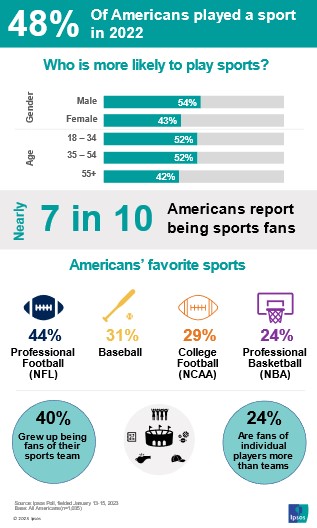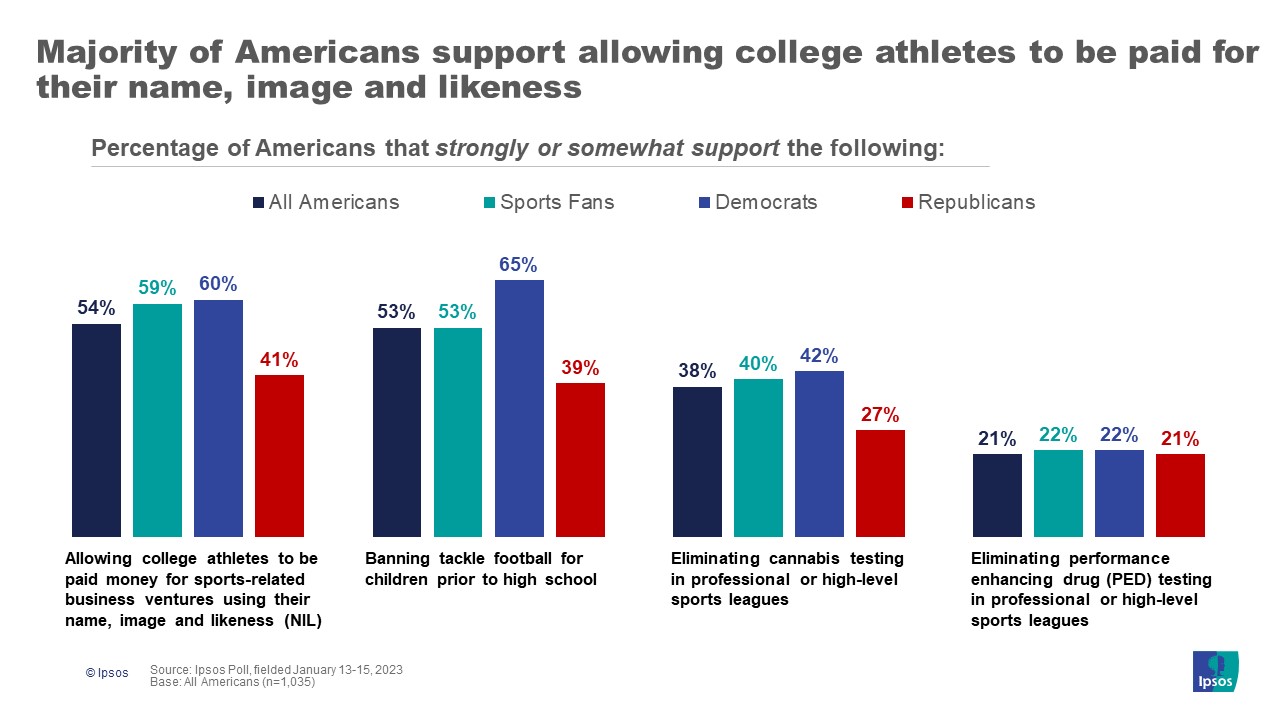Cornhole and bowling are the sports most Americans played last year
Washington, D.C., February 22, 2023 – A new Ipsos poll finds that two in three Americans are sports fans, and nearly half report that they played a sport in 2022. Cornhole and bowling are the sports most Americans played last year. Americans with higher income and education, younger Americans, and white Americans were more likely to have played sports last year.
The poll also finds that, in terms of fandom, football has the largest fan base, with more than two in five describing themselves as NFL fans. Lastly, Americans view player safety and injuries as the most important issue facing the sports world, and while they are more split on whether or not to continue games after medical emergencies occur, a strong majority believe player safety should be prioritized over entertainment.

Detailed Findings
1. Around half of Americans played a sport in 2022, with younger Americans, white Americans, and those with higher levels of income and education more likely to report doing so.
- Forty-eight percent of Americans report playing any sport in 2022. Americans ages 18-34 (52%) and 35-54 (52%) are more likely to have played a sport than those ages 55+ (42%).
- In addition, Americans with a college degree (60%), those earning more than $100K (58%), and white Americans (50%) are more likely than their counterparts to have played a sport.
- Cornhole (20%), bowling (19%) and swimming (18%) were the most played sports by Americans in 2022. Second tier sports included cycling (15%), basketball (10%) and golf (9%).
2. Two in three Americans are self-described fans of sports. While football has the strongest foothold, differences in fandom exist across age groups.
- Sixty-eight percent of Americans report being a fan of any sport. A majority across all age groups are sports fans. However, those ages 55+ (72%) and 35-54 (71%) are more likely than Americans younger than 35 (61%) to be fans.
- Men (75%) are more likely than women (62%) to report being sports fans.
- Football is king among Americans, as the NFL (44%) is the most popular sport. Other popular sports include baseball (31%), college football (29%), the NBA (24%), and college basketball (23%).
- Interest among Americans under 35 is split. While the NFL is most popular (35%), they also show interest in baseball (23%), the NBA (23%), college football (22%), and college basketball (20%).
- In contrast, Americans ages 35-54 and 55+ tend to show a lot more interest in classic sports, specifically the NFL (46% and 49%, respectively), baseball (31% and 38%), and college football (30% and 35%).
- Two in five Americans (40%) say they are a fan of their current team because they grew up with their families being a fan of that team. Men, those under the age of 55, Northeasterners, and Midwesterners are more likely to share this sentiment than their counterparts.
3. Player safety/injuries are the viewed as the main issue facing the sports world today. While most view a player’s medical privacy and safety as paramount, the show must go on: A bare majority say that after a medical emergency, game play should resume once a player is helped.
- Forty-seven percent of Americans say that player safety/injuries are the biggest issue currently facing the sports world.
- Democrats (57%) and independents (47%) are more likely to share this sentiment than Republicans (38%).
- Seven in ten Americans agree that a player’s medical privacy should always be protected, even if it leads to less informed sports bettors.
- In the same vein, an overwhelming majority (87%) believe that professional sports leagues should prioritize player safety and wellbeing over the entertainment of fans.
- Americans are more split on whether games should be played or canceled after medical emergencies happen on the field. However, they do slightly favor continuing the competition (52%).
- Women (49%) are more likely than men (39%) to say that games should be canceled in the event of a medical emergency.
- Black (57%) and Hispanic (51%) Americans are more likely than white Americans (41%) to agree that games should be canceled in the event of a medical emergency.
- Republicans (64%) and independents (60%) are more likely than Democrats (40%) to say that the game should continue after the athlete is taken care of.
4. A slim majority of Americans, particularly Black Americans, support allowing college athletes to profit off their name, image, and likeness (NIL).
- Fifty-four percent of Americans say they support rules allowing college athletes to be paid for sports-related business ventures using their name, image, and likeness. Black Americans (70%) are much more likely to support payment for NIL than white Americans (50%).
- Likewise, 57% of Americans agree that the monetization of NIL has a positive impact on college athletics by ensuring college players are fairly compensated.
- Among other issues in sports, fifty-three percent of Americans say that tackle football should be banned for children prior to high school. Democrats (65%), women (60%) and independents (53%) are more likely than their counterparts to agree.
- Lastly, nearly two in five Americans (38%) support eliminating cannabis testing in professional and other high-level sports leagues.

5. The Super Bowl was the most watched event in 2022.
- Fifty-two percent of Americans say they watched Super Bowl LVI in 2022. It is the only event that a majority of Americans reported watching.
- Americans under 35 were less likely to watch the Super Bowl (42%) than those 35 or older (56%).
- Other highly watched events include the 2022 Winter Olympics (36%), College Football playoffs (30%), the World Series (30%), and the 2022 World Cup (29%).
- Additionally, Americans were most likely to have watched an entire game for the NFL (45%). Around three in ten report doing the same for college football (30%) and the MLB (27%).
- While most Americans are fans of teams, one in four consider themselves to be fans of an individual player more than a specific team (24%).
- Black (32%) and Hispanic (28%) Americans are more likely to follow specific players than white Americans (20%).
- Americans ages 18-34 (29%) and 35-54 (26%) are more likely than those ages 55+ (19%) to follow individual players over teams.
About the Study
This poll was conducted January 13-15, 2023, by Ipsos using the probability-based KnowledgePanel®. This poll is based on a nationally representative probability sample of 1,035 general population adults age 18 or older. The sample includes 81 official sports bettors. Since the official sports bettors have a low base size (N<100), interpret results with caution.
The margin of sampling error is plus or minus 3.2 percentage points for at the 95% confidence level, for results based on the entire sample of adults. The margin of sampling error takes into account the design effect, which was 1.12 for all respondents. For official sports bettors, the margin of sampling error is plus or minus 11.7 points at the 95% confidence level, and the design effect was 1.16. The margin of sampling error is higher and varies for results based on other sub-samples. In our reporting of the findings, percentage points are rounded off to the nearest whole number. As a result, percentages in a given table column may total slightly higher or lower than 100%. In questions that permit multiple responses, columns may total substantially more than 100%, depending on the number of different responses offered by each respondent.
The survey was conducted using KnowledgePanel, the largest and most well-established online probability-based panel that is representative of the adult US population. Our recruitment process employs a scientifically developed addressed-based sampling methodology using the latest Delivery Sequence File of the USPS – a database with full coverage of all delivery points in the US. Households invited to join the panel are randomly selected from all available households in the U.S. Persons in the sampled households are invited to join and participate in the panel. Those selected who do not already have internet access are provided a tablet and internet connection at no cost to the panel member. Those who join the panel and who are selected to participate in a survey are sent a unique password-protected log-in used to complete surveys online. As a result of our recruitment and sampling methodologies, samples from KnowledgePanel cover all households regardless of their phone or internet status and findings can be reported with a margin of sampling error and projected to the general population.
The study was conducted in English. The data were weighted to adjust for gender by age, race/ethnicity, education, Census region, metropolitan status, and household income. The demographic benchmarks came from the 2022 March Supplement of the Current Population Survey (CPS). The weighting categories were as follows:
- Gender (Male, Female) by Age (18–29, 30–44, 45-59 and 60+)
- Race/Hispanic Ethnicity (White Non-Hispanic, Black Non-Hispanic, Other, Non-Hispanic, Hispanic, 2+ Races, Non-Hispanic)
- Education (Less than High School, High School, Some College, Bachelor or higher)
- Census Region (Northeast, Midwest, South, West)
- Metropolitan Status (Metro, non-Metro)
- Household Income (Under $25,000, $25,000-$49,999, $50,000-$74,999, $75,000-$99,999, $100,000-$149,999, $150,000+)
About Ipsos
Ipsos is one of the largest market research and polling companies globally, operating in 90 markets and employing over 18,000 people.
Our passionately curious research professionals, analysts and scientists have built unique multi-specialist capabilities that provide true understanding and powerful insights into the actions, opinions and motivations of citizens, consumers, patients, customers or employees. We serve more than 5000 clients across the world with 75 business solutions.
Founded in France in 1975, Ipsos is listed on the Euronext Paris since July 1st, 1999. The company is part of the SBF 120 and the Mid-60 index and is eligible for the Deferred Settlement Service (SRD).
ISIN code FR0000073298, Reuters ISOS.PA, Bloomberg IPS:FP www.ipsos.com



